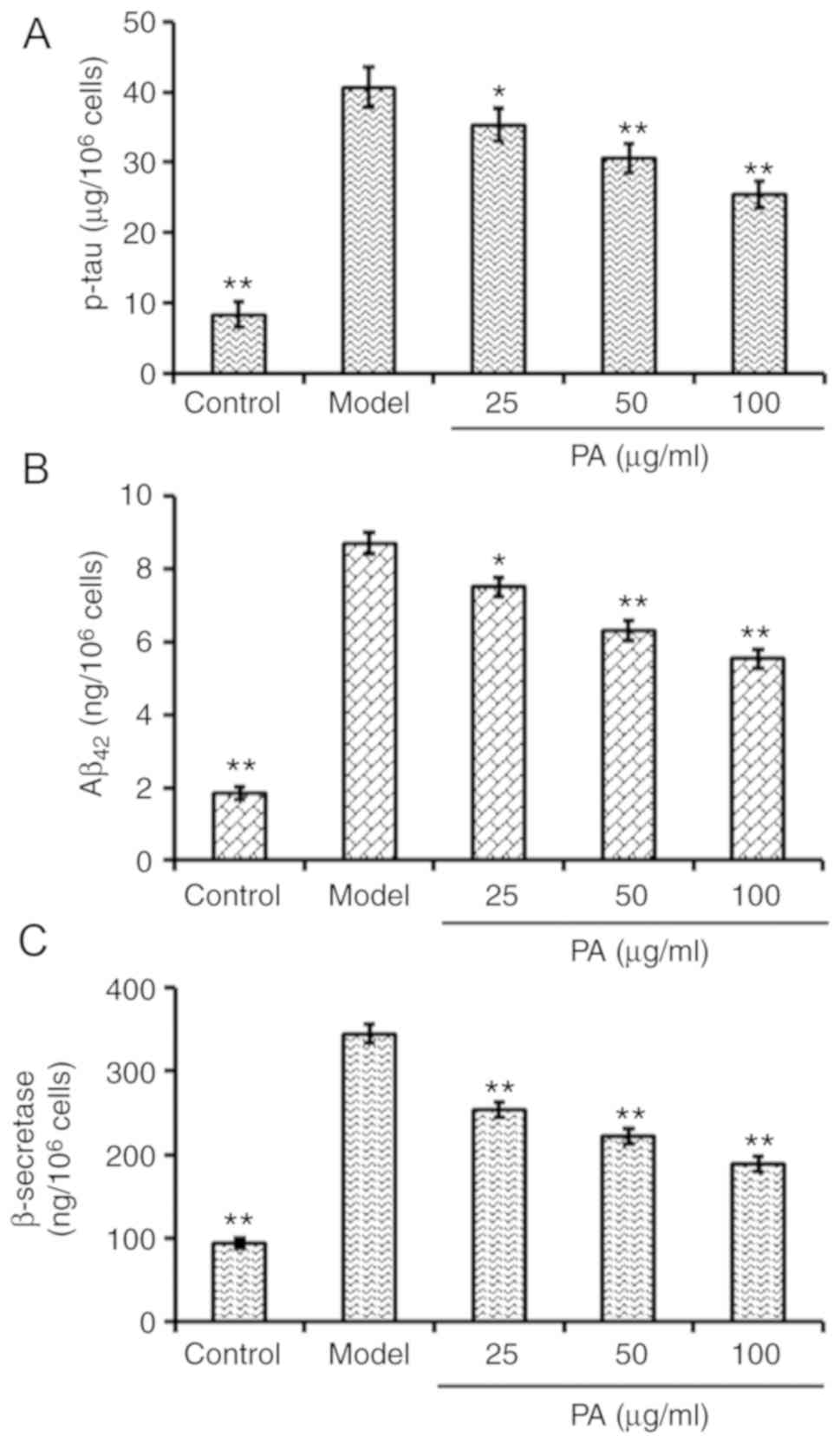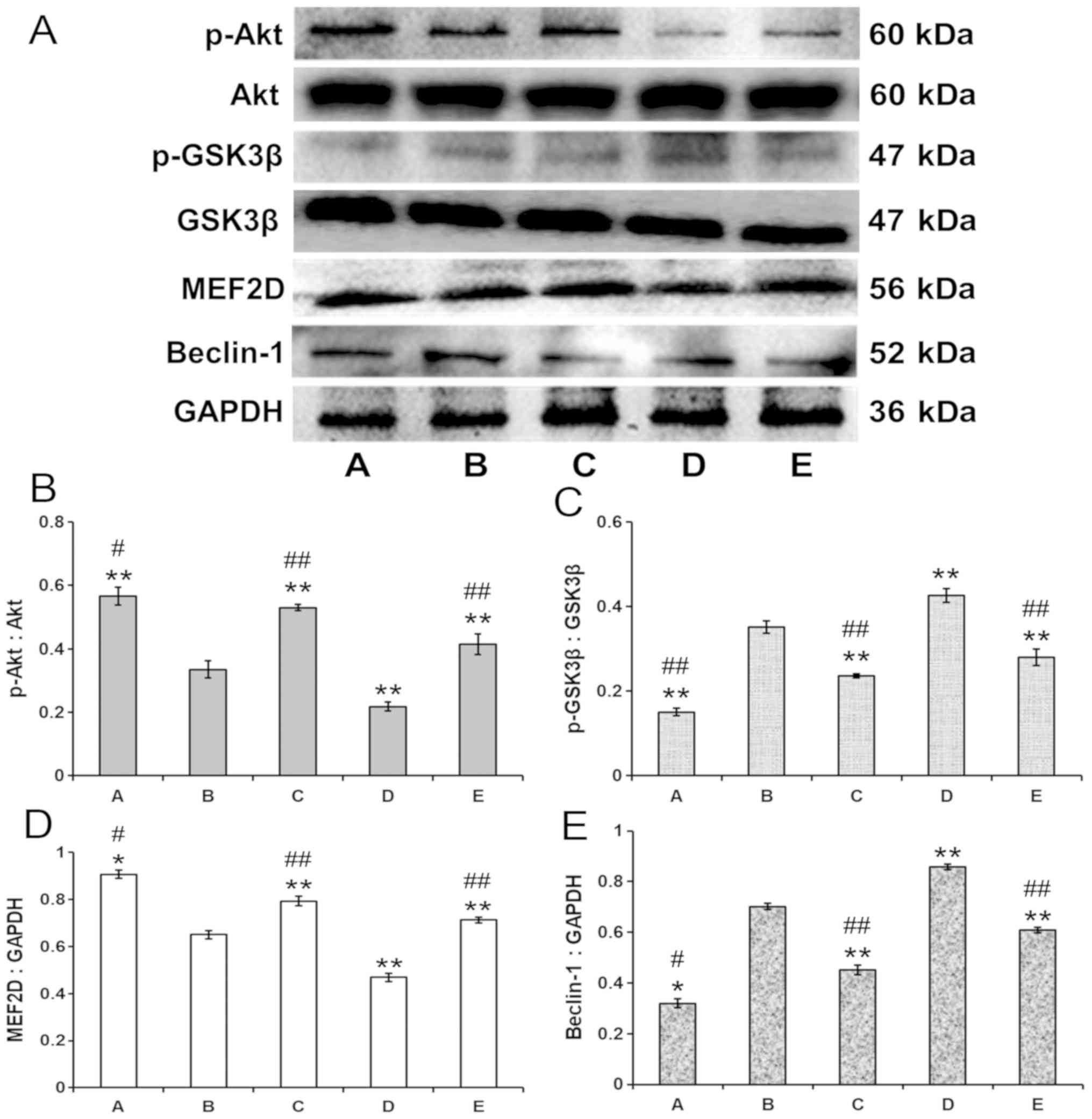|
1
|
Reas ET, Hagler DJ Jr, White NS, Kuperman
JM, Bartsch H, Cross K, Loi RQ, Balachandra AR, Meloy MJ, Wierenga
CE, et al: Sensitivity of restriction spectrum imaging to memory
and neuropathology in Alzheimer's disease. Alzheimers Res Ther.
9:552017. View Article : Google Scholar : PubMed/NCBI
|
|
2
|
Lue LF, Guerra A and Walker DG: Amyloid
beta and tau as Alzheimer's disease blood biomarkers: Promise from
new technologies. Neurol Ther. 6 (Suppl 1):S25–S36. 2017.
View Article : Google Scholar
|
|
3
|
Mamada N, Tanokashira D, Ishii K, Tamaoka
A and Araki W: Mitochondria are devoid of amyloid β-protein
(Aβ)-producing secretases: Evidence for unlikely occurrence within
mitochondria of Aβ generation from amyloid precursor protein.
Biochem Biophys Res Commun. 486:321–328. 2017. View Article : Google Scholar : PubMed/NCBI
|
|
4
|
Ban JY, Cho SO, Jeon SY, Bae K, Song KS
and Seong YH: 3,4-dihydroxybenzoic acid from Smilacis chinae
rhizome protects amyloid beta protein (25–35)-induced neurotoxicity
in cultured rat cortical neurons. Neurosci Lett. 420:184–188. 2007.
View Article : Google Scholar : PubMed/NCBI
|
|
5
|
Xue XY, Zhang Z, Zhou XW, Zhou X and Luo
HM: The inhibition effect of protocatechuic acid on the mRNA
expression of APP on M146L cell. Zhong Yao Cai. 35:1813–1816.
2012.(In Chinese). PubMed/NCBI
|
|
6
|
Song Y, Cui T, Xie N, Zhang X, Qian Z and
Liu J: Protocatechuic acid improves cognitive deficits and
attenuates amyloid deposits, inflammatory response in aged AβPP/PS1
double transgenic mice. Int Immunopharmacol. 20:276–281. 2014.
View Article : Google Scholar : PubMed/NCBI
|
|
7
|
Todde V, Veenhuis M and van der Klei IJ:
Autophagy: Principles and significance in health and disease.
Biochim Biophys Acta. 1792:3–13. 2009. View Article : Google Scholar : PubMed/NCBI
|
|
8
|
Qian X, Li X, Cai Q, Zhang C, Yu Q, Jiang
Y, Lee JH, Hawke D, Wang Y, Xia Y, et al: Phosphoglycerate kinase 1
phosphorylates beclin1 to induce autophagy. Mol Cell.
65:917–931.e6. 2017. View Article : Google Scholar : PubMed/NCBI
|
|
9
|
Bustos V, Pulina MV, Bispo A, Lam A,
Flajolet M, Gorelick FS and Greengard P: Phosphorylated Presenilin
1 decreases β-amyloid by facilitating autophagosome-lysosome
fusion. Proc Natl Acad Sci USA. 114:7148–7153. 2017. View Article : Google Scholar : PubMed/NCBI
|
|
10
|
Gu X, Guo W, Zhao Y, Liu G, Wu J and Chang
C: Deoxynivalenol-induced cytotoxicity and apoptosis in IPEC-J2
cells through the activation of autophagy by inhibiting
PI3K-AKT-mTOR signaling pathway. ACS Omega. 4:18478–18486. 2019.
View Article : Google Scholar : PubMed/NCBI
|
|
11
|
Yang Q, She H, Gearing M, Colla E, Lee M,
Shacka JJ and Mao Z: Regulation of neuronal survival factor MEF2D
by chaperone-mediated autophagy. Science. 323:124–127. 2009.
View Article : Google Scholar : PubMed/NCBI
|
|
12
|
Xu H, Li J, Wang Z, Feng M, Shen Y, Cao S,
Li T, Peng Y, Fan L, Chen J, et al: Methylene blue attenuates
neuroinflammation after subarachnoid hemorrhage in rats through the
Akt/GSK-3β/MEF2D signaling pathway. Brain Behav Immun. 65:125–139.
2017. View Article : Google Scholar : PubMed/NCBI
|
|
13
|
Song Z, Feng C, Lu Y, Gao Y, Lin Y and
Dong C: Overexpression and biological function of MEF2D in human
pancreatic cancer. Am J Transl Res. 9:4836–4847. 2017.PubMed/NCBI
|
|
14
|
Chen ZW, Liu A, Liu Q, Chen J, Li WM, Chao
XJ, Yang Q, Liu PQ, Mao ZX and Pi RB: MEF2D mediates the
neuroprotective effect of methylene blue against glutamate-induced
oxidative damage in HT22 hippocampal cells. Mol Neurobiol.
54:2209–2222. 2017. View Article : Google Scholar : PubMed/NCBI
|
|
15
|
Brayton CF: Dimethyl sulfoxide (DMSO): A
review. Cornell Vet. 76:61–90. 1986.PubMed/NCBI
|
|
16
|
Usman MS, Hussein MZ, Kura AU, Fakurazi S,
Masarudin MJ and Ahmad Saad FF: Graphene oxide as a nanocarrier for
a theranostics delivery system of protocatechuic acid and
gadolinium/gold nanoparticles. Molecules. 23(pii): E5002018.
View Article : Google Scholar : PubMed/NCBI
|
|
17
|
Huang L, Deng M, He Y, Lu S, Ma R and Fang
Y: β-asarone and levodopa co-administration increase striatal
dopamine level in 6-hydroxydopamine induced rats by modulating
P-glycoprotein and tight junction proteins at the blood-brain
barrier and promoting levodopa into the brain. Clin Exp Pharmacol
Physiol. 43:634–643. 2016. View Article : Google Scholar : PubMed/NCBI
|
|
18
|
Koehler D, Shah ZA and Williams FE: The
GSK3β inhibitor, TDZD-8, rescues cognition in a zebrafish model of
okadaic acid-induced Alzheimer's disease. Neurochem Int. 122:31–37.
2019. View Article : Google Scholar : PubMed/NCBI
|
|
19
|
Theendakara V, Bredesen DE and Rao RV:
Downregulation of protein phosphatase 2A by apolipoprotein E:
Implications for Alzheimer's disease. Mol Cell Neurosci. 83:83–91.
2017. View Article : Google Scholar : PubMed/NCBI
|
|
20
|
Wang Y, Song X, Liu D, Lou YX, Luo P, Zhu
T, Wang Q and Chen N: IMM-H004 reduced okadaic acid-induced
neurotoxicity by inhibiting Tau pathology in vitro and in vivo.
Neurotoxicology. 75:221–232. 2019. View Article : Google Scholar : PubMed/NCBI
|
|
21
|
Krzysztoforska K, Mirowska-Guzel D and
Widy-Tyszkiewicz E: Pharmacological effects of protocatechuic acid
and its therapeutic potential in neurodegenerative diseases: Review
on the basis of in vitro and in vivo studies in rodents and humans.
Nutr Neurosci. 22:72–82. 2019. View Article : Google Scholar : PubMed/NCBI
|
|
22
|
Winter AN, Brenner MC, Punessen N,
Snodgrass M, Byars C, Arora Y and Linseman DA: Comparison of the
neuroprotective and anti-inflammatory effects of the anthocyanin
metabolites, protocatechuic acid and 4-hydroxybenzoic acid. Oxid
Med Cell Longev. 2017:62970802017. View Article : Google Scholar : PubMed/NCBI
|
|
23
|
Adedara IA, Okpara ES, Busari EO, Omole O,
Owumi SE and Farombi EO: Dietary protocatechuic acid abrogates male
reproductive dysfunction in streptozotocin-induced diabetic rats
via suppression of oxidative damage, inflammation and caspase-3
activity. Eur J Pharmacol. 849:30–42. 2019. View Article : Google Scholar : PubMed/NCBI
|
|
24
|
Tang XL, Liu JX, Dong W, Li P, Li L, Lin
CR, Zheng YQ, Cong WH and Hou JC: Cardioprotective effect of
protocatechuic acid on myocardial ischemia/reperfusion injury. J
Pharmacol Sci. 125:176–183. 2014. View Article : Google Scholar : PubMed/NCBI
|
|
25
|
Yin X, Zhang X, Lv C, Li C, Yu Y, Wang X
and Han F: Protocatechuic acid ameliorates neurocognitive functions
impairment induced by chronic intermittent hypoxia. Sci Rep.
5:145072015. View Article : Google Scholar : PubMed/NCBI
|
|
26
|
Zeng Q, Siu W, Li L, Jin Y, Liang S, Cao
M, Ma M and Wu Z: Autophagy in Alzheimer's disease and promising
modulatory effects of herbal medicine. Exp Gerontol. 119:100–110.
2019. View Article : Google Scholar : PubMed/NCBI
|
|
27
|
Huang L, Lin M, Zhong X, Yang H and Deng
M: Galangin decreases p-tau, Aβ42 and β-secretase levels, and
suppresses autophagy in okadaic acid-induced PC12 cells via an
Akt/GSK3β/mTOR signaling-dependent mechanism. Mol Med Rep.
19:1767–1774. 2019.PubMed/NCBI
|
|
28
|
Deng M, Huang L, Ning B, Wang N, Zhang Q,
Zhu C and Fang Y: β-asarone improves learning and memory and
reduces Acetyl Cholinesterase and Beta-amyloid 42 levels in APP/PS1
transgenic mice by regulating Beclin-1-dependent autophagy. Brain
Res. 1652:188–194. 2016. View Article : Google Scholar : PubMed/NCBI
|
|
29
|
Zhang S, Gui XH, Huang LP, Deng MZ, Fang
RM, Ke XH, He YP, Li L and Fang YQ: Neuroprotective effects of
β-asarone against 6-hydroxy dopamine-induced parkinsonism via
JNK/Bcl-2/Beclin-1 pathway. Mol Neurobiol. 53:83–94. 2016.
View Article : Google Scholar : PubMed/NCBI
|
|
30
|
Huang L, Deng M, He Y, Lu S, Liu S and
Fang Y: β-asarone increases MEF2D and TH levels and reduces
α-synuclein level in 6-OHDA-induced rats via regulating the
HSP70/MAPK/MEF2D/Beclin-1 pathway: Chaperone-mediated autophagy
activation, macroautophagy inhibition and HSP70 up-expression.
Behav Brain Res. 313:370–379. 2016. View Article : Google Scholar : PubMed/NCBI
|
|
31
|
Reddy PH, Yin X, Manczak M, Kumar S,
Pradeepkiran JA, Vijayan M and Reddy AP: Mutant APP and amyloid
beta-induced defective autophagy, mitophagy, mitochondrial
structural and functional changes and synaptic damage in
hippocampal neurons from Alzheimer's disease. Hum Mol Genet.
27:2502–2516. 2018. View Article : Google Scholar : PubMed/NCBI
|
|
32
|
Song J, Ma SJ, Luo JH, Zhang H, Wang RX,
Liu H, Li L, Zhang ZG and Zhou RX: Melatonin induces the apoptosis
and inhibits the proliferation of human gastric cancer cells via
blockade of the AKT/MDM2 pathway. Oncol Rep. 39:1975–1983.
2018.PubMed/NCBI
|
|
33
|
Zhang LY, Liu ZH, Zhu Q, Wen S, Yang CX,
Fu ZJ and Sun T: Resolvin D2 relieving radicular pain is associated
with regulation of inflammatory mediators, Akt/GSK-3β signal
pathway and GPR18. Neurochem Res. 43:2384–2392. 2018. View Article : Google Scholar : PubMed/NCBI
|
|
34
|
Yao Y, Wang Y, Kong L, Chen Y and Yang J:
Osthole decreases tau protein phosphorylation via PI3K/AKT/GSK-3β
signaling pathway in Alzheimer's disease. Life Sci. 217:16–24.
2019. View Article : Google Scholar : PubMed/NCBI
|
|
35
|
Hu S, Cui W, Zhang Z, Mak S, Xu D, Li G,
Hu Y, Wang Y, Lee M, Tsim KW and Han Y: Indirubin-3-oxime
effectively prevents 6OHDA-induced neurotoxicity in PC12 cells via
activating MEF2D through the inhibition of GSK3β. J Mol Neurosci.
57:561–570. 2015. View Article : Google Scholar : PubMed/NCBI
|



















